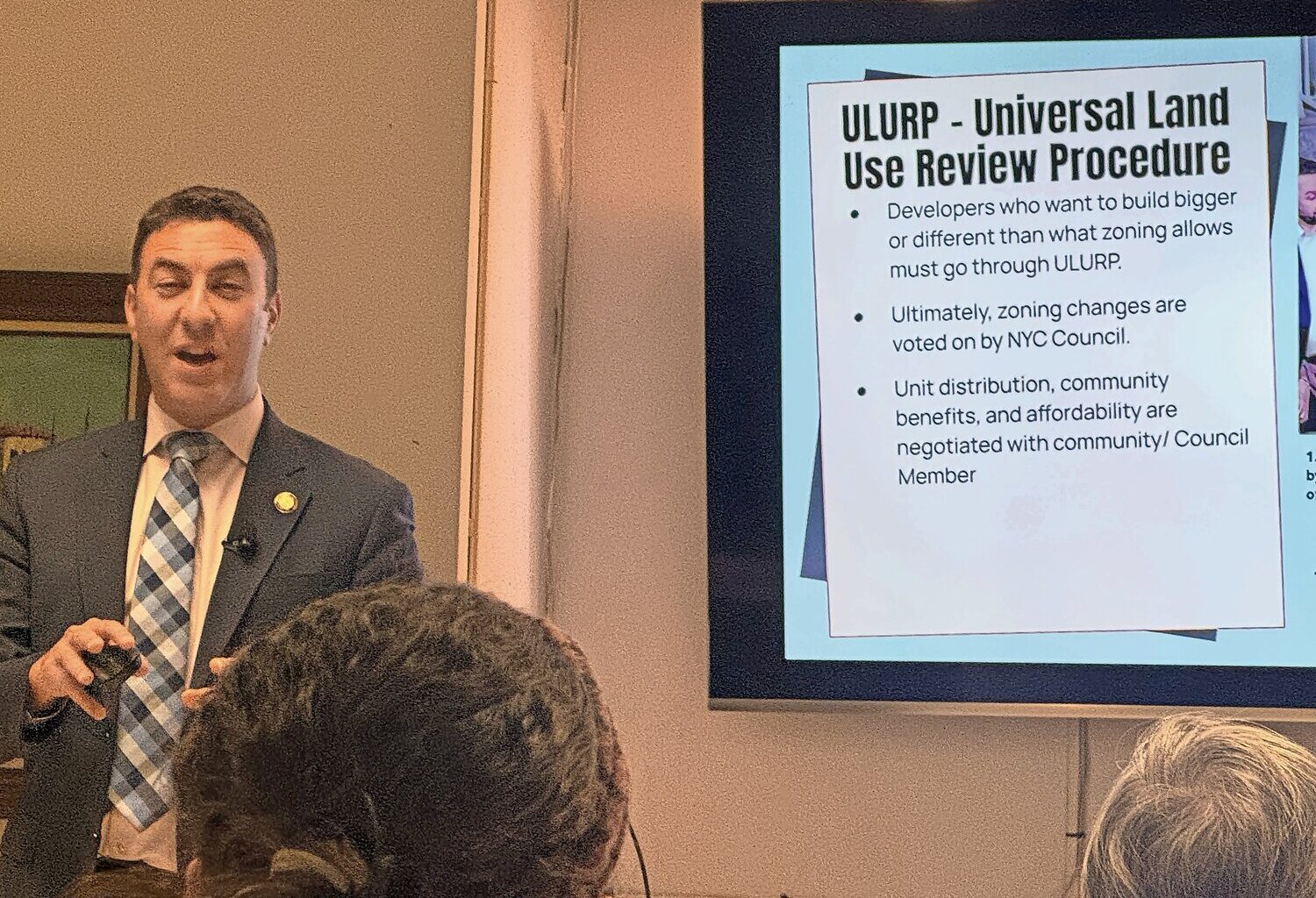Michelle Mullen
As the mayoral administration looks to take charge of housing and zoning decisions, Northwest Bronx leaders are urging voters to fight back.
Three proposals on this year’s election ballot would amend the City Charter, a document comparable to a city’s constitution, to reduce the role of local government in City land-use reviews.
The measures are intended to streamline affordable housing development amid a worsening housing crisis by shifting decision-making power to the mayor and their appointees.
Among those appealing to local Bronxites is Councilman Eric Dinowitz, who has held several town halls and information sessions to break down the proposals, his latest on Oct 16.
“These questions boil down to one thing,” Dinowitz explained. “Who determines the fate of our communities?”
City Charter Changes
As it stands, developers seeking to exceed zoning limits or change a land-use designation go through the city’s Uniform Land Use Review Procedure, or ULURP. This multi-step process takes up to seven months and involves review by the local community board, the borough president, and ultimately, a vote by the City Council.
Under the proposals, labeled Proposals 2 through 4, several key steps in the land-use process would bypass those bodies entirely to speed up approval.
The ULURP process begins with community boards, which serve as an advisory body to the City Council.
Community Board 8, or CB8, represents the greater Riverdale area. While they can’t directly approve or reject projects, they do hold public hearings and issue recommendations that reflect the sentiments of the neighborhood.
Their guidance often shapes how council members vote, influencing factors such as building height, affordability and parking.
Question 2 would allow the Board of Standards and Appeals — whose members are appointed by the mayor — to approve certain rezonings for “affordable housing” without requiring City Council oversight. Question 3, known as the “Expedited Land Use Review Procedure,” would roll back ULURP and allow the mayor-controlled City Planning Commission to approve so-called “modest rezonings” within 30 to 45 days, again bypassing the Council.
Question 4 would go even further, establishing an “Affordable Housing Appeals Board” made up of the mayor, a borough president and the City Council speaker. That board could overturn local decisions that reject or modify rezonings with a simple majority of votes.
Mayor Eric Adams has framed the proposals as a way to “cut red tape” and speed up the development of affordable housing. But community leaders across the Northwest Bronx argue that the plan would undermine public oversight and weaken local democracy.
“If these pass, it’s going to be the developer working with a city agency underneath the mayor — not the people in this room, who decide what gets built in our neighborhoods,” Dinowitz said at the Oct. 17 town hall, signaling to a room of attendees.
Local Leaders Push Back
The ballot questions have also become a major point of discussion at recent Community Board 8 meetings.
Longtime Land Use Committee Chair Charles Moerdler argues that removing the City Council’s power over land-use approvals would undo decades of precedent and silence the very people the system was designed to represent.
“What this proposes to do is to take away from the only current representatives that have authority to say no,” he said.
Moerdler, a former city buildings commissioner, also criticized the language of the ballot questions as “intentionally misleading,” noting that terms like “affordable housing” sound appealing but may not show the whole picture.
“There isn’t even a consistent definition of affordable housing,” he said. “People need to know that the numbers are not accurate when actually applied.”
Currently, federal guidelines determine who qualifies for affordable housing based on Area Median Income (AMI), which calculates average household incomes across an entire region. In New York City’s case, that region includes counties rich with affluent suburbs, like Westchester and Rockland County — areas with median incomes far higher than in Brooklyn or the Bronx.
“If you removed the suburbs you’d get something resembling a true citywide income, but with them, the data is distorted beyond recognition,” Moerdler said. “What’s affordable to a household earning $100,000 in Westchester isn’t affordable to a family in the Bronx. What’s affordable in Riverdale is not for people in the South Bronx.”
At CB8, tensions over the proposed amendments came to a boiling point in early October, when members of the Land Use Committee and Law, Rules and Ethics Committees took a bold, but unusual step.
Since 2018, the city has prohibited community boards from taking official stances on ballot measures, citing “restrictions on electioneering.” To comply with that rule, the committees formally adjourned a joint meeting and continued the discussion outside city property. There, as private citizens, they drafted and signed a letter to The Press, urging residents to vote against the measures.
“The mayor wants to centralize control of housing in City Hall,” Moerdler said. “We’re saying, let the people who live here decide what happens to their neighborhoods.”
With early voting beginning October 26 and Election Day on November 4, community leaders are emphasizing what they see as a clear choice between speed and representation.
“This is an incredibly important vote you’re going to take in the next election,” Dinonwitz said. “You are voting on what the future of our city looks like for generations to come. It’s the same question: Who determines the fate of the communities? Well, under this plan, the responsibility is shifted towards the mayor.”
Keywords
NYC charter amendments,
Bronx housing fight,
affordable housing proposals,
Riverdale zoning debate,
Eric Dinowitz town hall,
ULURP changes,
community board land use

